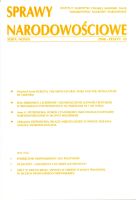Czesi na polskim Wołyniu w latach międzywojennych
Czechs in Polish Volhynia, 1919-1939
Author(s): Michał JarneckiSubject(s): Cultural Essay, Political Essay, Societal Essay
Published by: Instytut Slawistyki Polskiej Akademii Nauk
Keywords: Czechs; Polish Volhynia; national minorities; Ukraine; migration; history of migration
Summary/Abstract: A small number of Czech settlers arrived in Volhynia, the most rural province in Western Russia, in the second half of the 20th century. The Russian authorities favored this migration for one reason: they hoped that the Czech minority would weaken the Polish community living there. The Czechs, who made up ca. 1,5-2% of the entire population of Volhynia, soon recognized that only a loyal attitude towards the Russian State and, in a later period the Polish State, could guarantee this numerically small ethnic group some success among the Polish and Ukrainian populations. The local administration in many ways supported the loyalty of ethnic minorities in Volhynia. Although economically the area was developing rather quickly, upon the eve of the WW I, it was still an agricultural province, and the majority of Czechs worked in this sector, with some owning arable land. Many of the Czechs owned agricultural machines on their farms, and hop cultivation was the most important source of profit for the settlers. The Czechs were active in social and cultural life. Settlements had newspapers, orchestras, choirs, as well as their famous volunteer Fire Brigades. Education and schooling was an important problem. Although the Polish authorities favored a system of polonization, many Czech children nevertheless attended bilingual schools. Moreover, one of the settlers, Vladimir Meduna, was a member of Parliament in the 1930s. In the same period, an honorary consulate opened in the small town of Kwsilow, with Vladimir Svarovsky as its head. Unfortunately, the Czech settlements in Volhynia negatively influenced Polish-Czechoslovak relations in the interwar period.
Journal: Sprawy Narodowościowe
- Issue Year: 2008
- Issue No: 32
- Page Range: 119-133
- Page Count: 15
- Language: Polish

